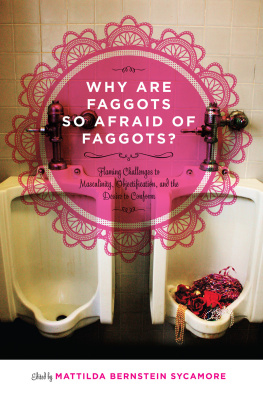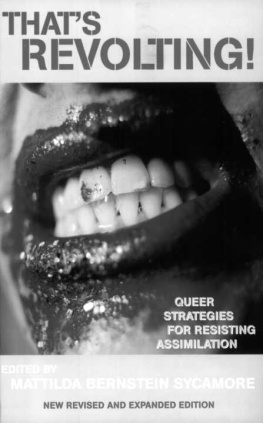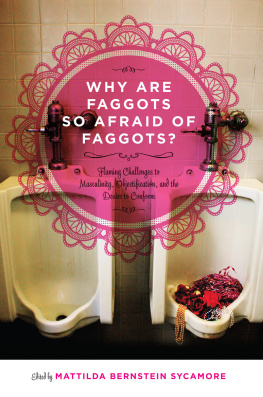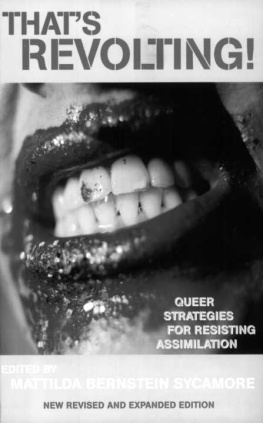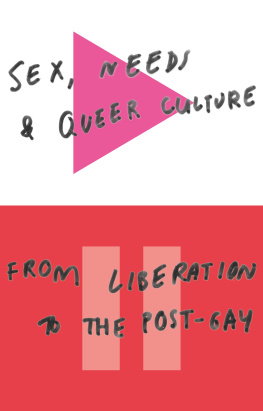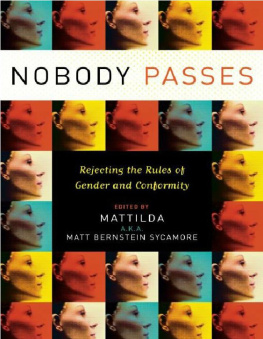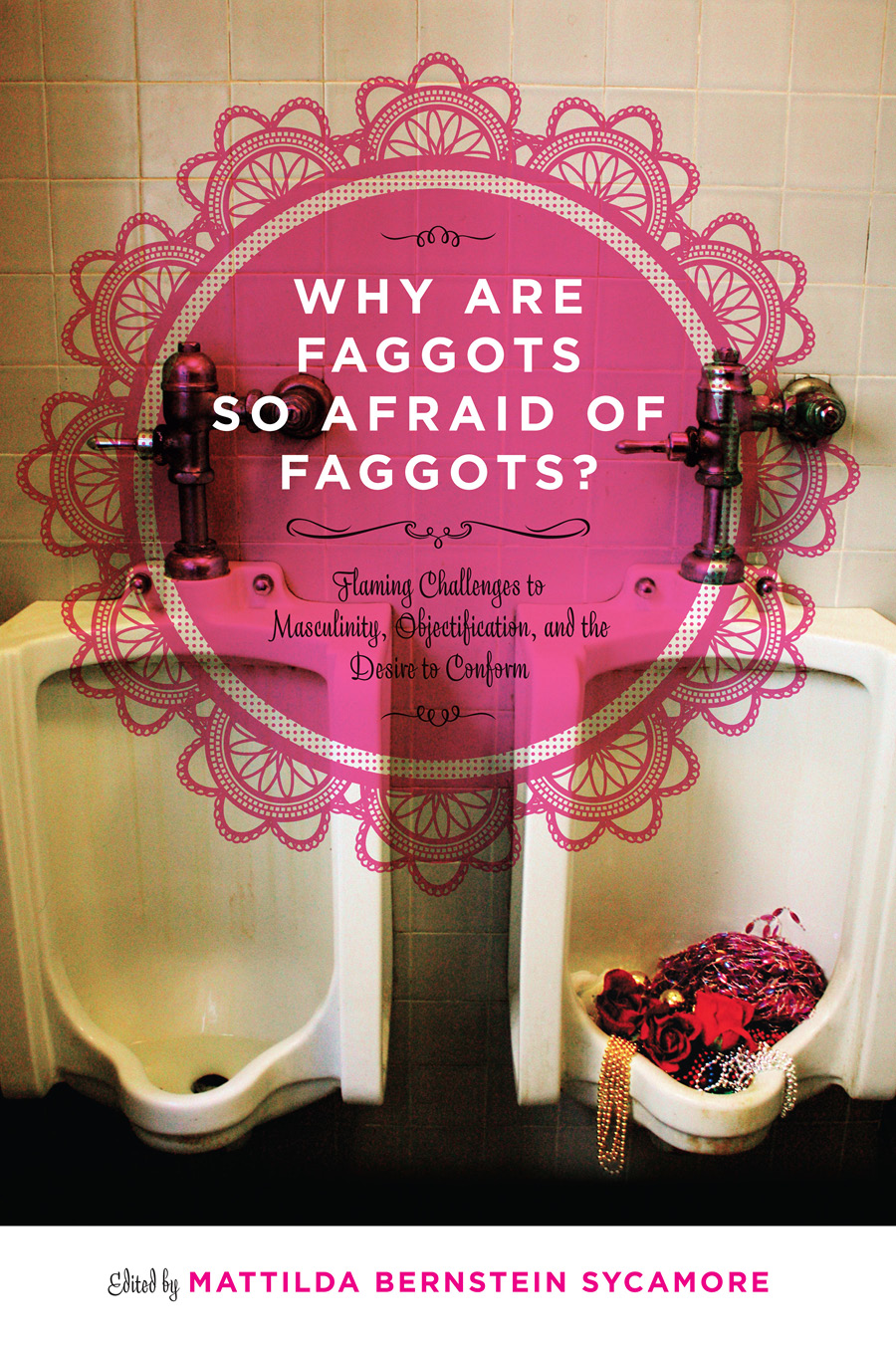To the queens, the bitches, the he-shes, the not-mes, the runway reading divas, tumbling backroom baristas, swishy sissy sisters and, of course to all those faggots who are afraid of me.
Why Are Faggots So Afraid of Faggots?
an introduction
Mattilda Bernstein Sycamore
Weve grown to appreciate the way our eyes give everything away, our hips sway, our voices flow up and down and then up again: hold me. Weve embraced our hunger for bushes and beaches, back alleys and bathrooms and anywhere else we can find those bodies we once shunned: our own. Weve come to terms with our deviance, our defiance, our love for fucking and flowers. Weve pushed inward and outward at once; weve learned to hold one another even if its only that moment, that taste, that tongue to tongue or the imprint of sweaty fingertips.
And still, we are losing hope. We wonder how our desires have led to an endless quest for Absolut vodka, Diesel jeans, rainbow Hummers, pec implants, Pottery Barn, and the perfect abs and asshole. As backrooms get shut down to make way for wedding vows, and gay sexual culture morphs into straight-acting dudes hangin out, we wonder if we can still envision possibilities for a flaming faggotry that challenges the assimilationist norms of a corporate-cozy lifestyle.
We wonder what happened to our dreams of a world of sexual splendor only bounded by the limits of imagination. Instead, we find ourselves in a culture where party and play means close the blinds, lock the door, and hope that no one will glimpse our degradation. Masculine ideals have long reigned supreme in male sexual spaces, from the locker room to the tea room, the bars to the boardrooms. Yet now a sanitized, straight-friendly version of gay identity exists side by side with the brutal, calculated hyper-objectification of internet cruising: scorn becomes just a preference, lack of respect is assumed, and lying is a given. We scan the options: HIV-neg, STD-free, UB2 . Masc only, no femmes or fatties. Straight acting, straight appearing. No blacks or Asians. Must be discreet. Is this what has become of the intimacies we crave?
Why Are Faggots So Afraid of Faggots is an emergency intervention. Its also a deeply personal project for me. As a genderqueer faggot and a queen with a certain amount of notoriety, I find myself incredibly inspired by the politics and potentials of trans, genderqueer, and gender-defiant subcultures. Simultaneously I find myself less and less hopeful in the male sexual spaces I also inhabit. I wonder: if the desire I hold dear has only led to a product-driven sexual marketplace, what are the possibilities for transformation?
This book comes hot on the heels of my previous two anthologies, Thats Revolting! Queer Strategies for Resisting Assimilation and Nobody Passes: Rejecting the Rules of Gender and Conformity . Thats Revolting! exposed the ways in which a gay elite has hijacked queer struggle in order to position their desires as universal needs, reimagining the dominant signs of straight conformity as the ultimate markers of gay success. Nobody Passes interrogated the act of passing as a means through which assimilation and cultural erasure often take place, and remain invisible. Why Are Faggots So Afraid of Faggots brings all of this analysis to bear on the question of what has given rise to the personal nightmares now intrinsic to gay sexual/social culture.
We are losing hope, but still we are hopeful. ML Sugie and Michael Faris skewer race stereotyping in online cruising, and argue for indiscriminate promiscuity as an antidote. D. Travers Scott reimagines the web beyond either/or limitations, and envisions an information superfeyway. Chris Bartlett reinvokes the gravity and levity in pre-AIDS gay cultures. Eric A. Stanley explores the perils and possibilities of a relationship between faggots who came of age at the height of AIDS hysteria. George and Ayala and Patrick Pato Hebert discuss cultural production as a means of community building. CAConrad exposes the connections between body fascism, class striving, and a pro-military gay identity, and embraces a self-assured fat-positive sexuality.
We are holding our contradictions up to the disco ball, watching them refract. James Villanueva roams the West Texas bars (straight and gay), where he find himself fetishized as either faggot or Latino. Shepperton Jones wonders whether he deliberately approaches highly-educated Asian men for bareback sex because he considers them lower risk for masculinity obsession and HIV. Ezra RedEagle Whitman struggles to find a space for himself as a gay Native American man who doesnt want to be bounded by Two-Spirit expectations of spiritual purity. Matthew Blanchard flees gay-on-gay harassment at a Virginia college campus for the crystal-lined, tina-torn, AIDS-quilted gay mecca of San Francisco. Harris Kornstein describes a relationship between three theater queens, from kindergarten to adulthood, and the ways in which these childhood friends both resist and fall into homophobic ways of targeting one another. Francisco Ibez Carrasco challenges the sexual apartheid that divides the healthy from the infected, while investigating the slippery slopes of self-medication through sex and drugs.
We are challenging hierarchies wherever we find them. Jason Lydon and Mishael Burrows expose homophobic prison normsone as prisoner, and the other as prison guard. Booh Edouardo writes about a short-lived friendship with a rich, older gay volunteer coordinator who uses New Age spirituality to essentialize, sexualize, and harass Edouardo. Gina de Vries exposes a website that glorifies frottage as the manly alternative to anal sex. Willow Aerin Fagan shares his efforts to outgrow the homophobia of a Christian fundamentalist upbringing, as well as to unearth the roots of his fathers violence. Larry Goldsmith questions the hypocrisy of the national gay organizations that enforce a promilitary agenda while refusing to support alleged WikiLeaks whistleblower Bradley Manning, a gay soldier imprisoned by the US government. Debanuj DasGupta flees a Master/slave relationship where he plays the docile Asian to his white Superman captor, in favor of a search for the routes that immigrant faggots take to find one another. Kristen Stoeckeler encounters gender policing in gay bars and bathrooms, as well as hierarchies of masculinity in drag king cultures and the possibilities of female-bodied faggotry. Ali Abbas confronts gay mythologies of homophobic Arabs, and the hypocritical agenda of gay do-gooders seeking to civilize the world.
We are in love, and we are in lust. And yes, we are cruising. Lewis Wallace writes about the tangle of desire and failure between two trans guys. Jaime Cortez illuminates a late-night streetscape where sex-for-pay and sex-for-play, sexual identity, and sexual desire collide. Khary Polk fights his fears that he and all other black fags are doomed, in order to find sexual satisfaction and develop personal standards of responsibility. Nick Clarkson romances a guy twice his age, but it turns out his catch is unable to conceptualize the pairing. Philip Patston describes the tricky conversations necessary in order to negotiate attraction between disabled and non-disabled fags. Thomas Glave watches gay men embracing on the street, and interrogates the childhood fears that become adulthood longing. Tommi Avicolli Mecca shows us the scene for queens and their critics/admirers on the streets in 1970s Philadelphia. Horehound Stillpoint plays by the rules hes learned over 30 years in San Francisco backroom bars, and still feels like hes failing.

